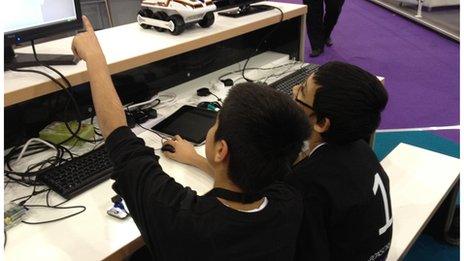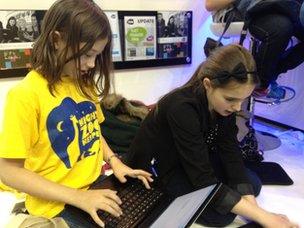Coding in class - teachers told to take a back seat
- Published

Let children take the lead in computer coding classes, experts advise
Shreenand, 13, has made an animation of a girl jumping up and down, by stringing together lines of computer code.
"These are the co-ordinates of where the girl is at. I can make her move around to another part of the screen when I press the flag icon," he says.
He has been learning how to code since he arrived at Lampton school in Hounslow, west London, a year ago.
"My teacher thought I was pretty good, so she set me a target of making a game a month in my spare time," he says.
"I look for a game I like to play and then make it myself. I like to know how the game actually works. Me and my partner Jonathan are pretty good in my class. We aren't that experienced yet but we want to write our own code when we know how."
Learning from scratch
The pupils use the Scratch tool, developed by Massachusetts Institute of Technology, which gives them them ready-made lines of code that they put together to make games and movies. The aim is that eventually they will begin to adapt the code and eventually write their own.
They have been learning coding in their citizenship lessons with teacher Juliet Heppell. She says you don't need to be a computing expert to get children started on the path to becoming confident computer coders.
"I am self-taught. I can do some very basic things, but beyond that I just know where to send them to learn more," she says.
Ms Heppell says YouTube is a key source of information for pupils too young to cope with the academic language of user manuals.
They are also encouraged to post queries on online programming forums. Ms Heppell sees this as a way of helping pupils communicate effectively and develop a sense of how to stay safe and secure online.
Her pupils were presenting their skills at the BETT educational technology fair. Another speaker was Ms Heppell's father, the digital education guru Prof Stephen Heppell.
The key is to let pupils take the lead when it comes to learning skills when a field where the technology changes constantly, says Prof Heppell.
Children are already programming Raspberry Pi microcomputers "with no worksheets", he says.
"They get help from other children. You just have to trust them. If you let the children lead you in their learning - they will get there before you".
'Digital natives'
Bill Liao, co-founder of the CoderDojo movement of free after-school coding clubs, couldn't agree more.
"Coding is a language skill," he says.

Experts agree that developing an enthusiasm for what code can do is key to learning how to use it
"You need to be a native speaker and for that you have to start young. We start kids at seven. The kids are the digital natives. Most adults are more akin to digital immigrants."
The movement grew out of a computer club set up by student James Whelton two years ago at his school in Ireland. Pupils who grasped things fastest taught others basic programming and web development.
There are now CoderDojos, run by volunteers, in 23 countries. Mr Liao is keen to emphasise that there is no curriculum imposed. Instead the idea is to make learning to code fun and sociable.
"The kids become mentors after just a few months. As a teacher you just have to give up your power a bit. The lighter the touch, the more effective the result.
"We encourage parents to stay but ask them to back away from the keyboard".
Learning logic
Chris Newman and Katherine Gordon are professional web developers, taking part in the BETT Hackathon competition to develop the best new app for use in the classroom.
They met while studying computer science at Keele University.
Chris says computers have changed beyond recognition since he taught himself to code on a Sinclair Spectrum - but he sounds a note of caution for would-be professional coders.
"You can't programme unless you can learn to think in logical steps," he says.
"If you put the thought into planning your app, you won't waste time later. You need to know the principles of the language and the syntax before you can write your own code. You need to think through what each computer is capable of and consider what your programme is going to do before you dive in and start coding."
For Ms Heppell, pupils need to have developed an enthusiasm for what they can do with coding before they learn logic.
"There are lots of opinions about where you need to start. I would say that first of all they need to become engaged in computing," she says.
For Bill Liao, learning to code should be a creative experience. He says the best coders are like poets, able to express their thoughts powerfully through the most effective, shortest pieces of code.
- Published4 February 2013
- Published29 January 2013
- Published11 January 2012
- Published15 March 2012